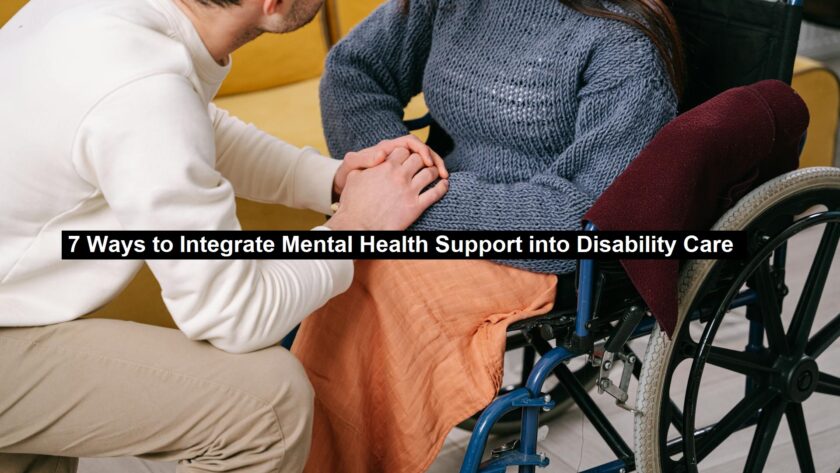In recent years, there’s been a growing understanding that physical and mental health are deeply intertwined—especially for individuals living with disabilities. While disability care has traditionally focused on physical or cognitive support, there’s now a significant push to integrate Mental Health Support into Disability Care. And rightly so.
People with disabilities are often more vulnerable to mental health challenges due to various factors—social isolation, chronic pain, communication barriers, or lack of community inclusion. As carers, support workers, and health professionals, we must evolve our care practices to meet the emotional and psychological needs of those we support.
Below, we explore 7 thoughtful and practical ways to weave mental health support into everyday disability care, leading to more compassionate, holistic outcomes for individuals and communities alike.
1. Listen Actively and Compassionately

One of our most effective tools in care is our capacity to pay attention to what’s being said and what’s being felt. People living with disabilities might not continually have the possibility of safe spaces to express their emotional worries. In many cases, they may not even recognise that what they’re experiencing is related to mental fitness.
Practicing energetic listening—where you certainly pay attention, display empathy, and withhold judgment—can create a nurturing environment where people feel secure speaking about their thoughts, concerns, or moods. This technique builds acceptance as accurate, validates their reports, and is regularly the first step in identifying the need for additional mental health support.
2. Encourage Routine and Structure
Maintaining a consistent daily routine may be helpful for intellectual well-being, particularly for those overwhelmed by change or uncertainty. This is mainly true in incapacity care environments, wherein small disruptions can result in emotional distress.
Support workers can help using the following:
- Creating a visible schedule or planner.
- Offering reminders and reassurance about upcoming duties or activities.
- Involving the man or woman in planning their routine additionally fosters independence and a sense of control.
- A disciplined routine reduces stress, builds self-belief, and contributes positively to mental health balance.
3. Foster Social Inclusion and Connection
Loneliness and social isolation are some of the most urgent challenges for people with disabilities. Without significant social interplay, it’s easy to fall into patterns of melancholy or anxiety. Integrating Mental Health Support into Disability Care ought to contain growing opportunities for connection.
Some ways to foster this include:
- Encouraging participation in community groups, classes, or sports clubs.
- Organising inclusive activities where individuals can bond over shared interests.
- Supporting access to technology for virtual communication with friends and family.
Social support isn’t just a nice thing to have—it’s a lifeline for many and a key pillar of mental well-being.
4. Incorporate Easy Mindfulness Techniques
While the concept of mindfulness could appear to be a fad, its fundamental goal is to keep people rooted in the here and now. Mindfulness practices can be very calming for people with disabilities, especially those who are prone to stress or sensory overload.
Formal meditation sessions are not necessary to begin. Simple tasks such as:
- Deep breathing exercises,
- Gentle stretching or yoga,
- Listening to calming music or
- Guided visualisations,
can offer moments of peace and self-regulation throughout the day. Over time, these practices can improve mood, reduce anxiety, and increase emotional resilience.
Read: Avoid Math Learning Loss with Awesome Math Summer Program
5. Work Together with Mental Health Specialists
As support workers and carers, it’s critical to understand our boundaries and know when to call in experts. Long-term melancholy, withdrawal, or behavioural changes that indicate deeper psychological needs may be observed.
Forming alliances with:
- Psychologists,
- Counsellors,
- Social workers,
- Or mental health nurses,
guarantees that the person gets comprehensive assistance. It also powerfully illustrates integrated treatment, which prioritises mental and physical health equally.
Suppose you’re interested in working in this industry. In that case, a degree like CHC33021 Certificate III in Individual Support (Disability) will assist you with the fundamental abilities to collaborate with experts and deliver compassionate, person-centered care.
6. Empower Through Choice and Autonomy
It’s easy—often unintentionally—for support workers to make decisions for rather than with the people they care for. However, autonomy plays a large role in mental well-being.
People with disabilities, like anyone else, have an essential right to make selections about their very own lives. Empowering them should contain the following:
- Offering selections around meals, sports, or garb.
- Asking for their enter on purpose putting or care making plans.
- Supporting them in expressing preferences—even in small daily matters.
When individuals feel heard and revered, it boosts vanity and reduces emotions of helplessness or frustration.
7. Create a Positive, Strength-Based Environment
Too frequently, disability care targets boundaries—what a person can’t do—rather than celebrating what they are able to do. This kind of deficit thinking can subtly affect someone’s self-esteem and emotional fitness.
A strength-primarily based technique flips this narrative. It looks for:
- Unique skills and hobbies,
- Past achievements,
- Personal goals and dreams.
By often highlighting strengths and celebrating even the smallest milestones, we assist people in constructing a sturdy experience of identity and motive—both of which are cornerstones of accurate mental fitness.
Concluding remarks
Including Support for Mental Health in Disability, there is no one-size-fits-all method for providing care. Seeing past a person’s diagnosis requires empathy, perseverance, and dedication. Support workers can significantly boost the lives of the people they care for by communicating with mental health experts, encouraging inclusion, encouraging autonomy, and actively listening.
Increasing your training and understanding is essential if you’re driven to change this sector. Certifications like CHC33021 Certificate III in Individual Support (Disability) give people the skills to deliver considerate, efficient care and drive change to build more welcoming, emotionally supportive communities. The foundation of top-notch disability care is the knowledge that each individual deserves the opportunity to flourish—emotionally, socially, and physically—in addition to support.




